Put not your trust in princes, nor in the sons of men,
in whom there is no hope.
Psalm 145:3
As the Truth of God begins to be revealed, so everything
in Russia will change.
Elder Nikolai (Guryanov)
Foreword
My interest in Gregory Rasputin was first sparked by a television programme fifty years ago on the fiftieth anniversary of his assassinatioin. Although, as a child, I could not investigate the claims made, I knew instinctively that there was something wrong with what was being said. I sensed a manipulation. Forty-two years ago I went to study at Oxford at the oldest college in Oxford, where Prince Felix Yusupov, the supposed murderer of Gregory Rasputin had studied and visited the "Yusupov room" where the prince had lived. I still could not understand the story since, with the Soviet Union and the Cold War still in full swing, I could not access the necessary archives on either side. Others have since done that and their results, given below, provide long-awaited justice.
Introduction
"Rasputin? A horse thief, a mad monk, a fraud with hypnotic powers, a priest-charlatan who manipulated stupid, hysterical women, a flagellant sectarian and pervert, a criminal who ruled the Russian Empire, dictating all policies and making all political appointments through bribery, a debauchee who organized orgies, a drunkard (like all Russians), a primitive barbarian, a satanist, a German spy, the reason for the downfall of Russia, even his name means ‘depraved’. I know, I have read the book and seen the film." So goes the view of the average "educated" Western person, as also largely that of the average Soviet citizen. However, they are all the brainwashed victims of the same slanderer and we recall that the Greek for "slanderer" is "o diavolos," "the devil".
In reality, not one bit of the above has been proved true, including that he was a debauchee and a drunkard, and most of it is patently untrue. It is all classic self-justifying Russophobia which says "Russians are primitive, we are superior, therefore we can do anything we like." He was certainly not mad, never a priest, monk, thief or spy, never a flagellant sectarian or a satanist, and had very little if any political influence. He was a pious Christian peasant, married with three children, who gave generous alms, understood the Holy Scriptures better than professors of the Bible, and was so pious that God gave him miraculous powers of healing. As for his surname, a nickname, it was common in his part of Siberia and denotes someone who lives where the roads are bad.
On the other hand, what we do know, and this ever since the publication of the memoirs of Prince Nikolay Zhevakhov in the 1920s, is that he was murdered by British spies, with the co-operation of rich, decadent, jealous and apostate Russian aristocrats, one a transvestite prince who dabbled in the occult and savagely and ritually battered Gregory Rasputin’s corpse, as the sadistic freemason and decadent Prince Yusupov himself boasted of doing, one a more or less Fascist politician, another a Romanov prince of notoriously loose morals who betrayed his relative the Tsar. All of them through their murderous betrayal, indirectly, handed Russia over to the genocidal Bolsheviks and their imported alien ideology for three generations, 75 years of hellish torment.
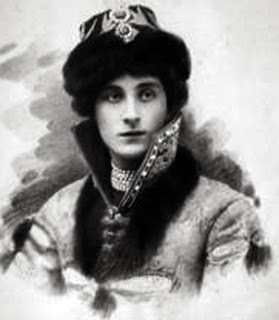 Prince Felix Yusupov.
Prince Felix Yusupov.
The Sources of the Slander
Recent research since the downfall of the Bolshevik regime a generation ago in 1991 has led to several new studies of Gregory Rasputin by professional historians and even veneration of "the Martyr Gregory" by some, including by the Elder Nikolai Guryanov, with an akathist composed and icons painted. So far unchallenged and also untranslated, because Western publishers only translate scurrilous works like those of the Soviet novelist Edvard Radzinsky, and not professionally-written works or the unsensational lives of the pious, these new Russian studies of professional historians like the seven volumes by Sergey Fomin and the books by Alexander Bokhanov, Yury Rassulin, Igor Evsin, Tatiana Mironova, and Oleg Platonov lead us to take a very different view.
All the myths about Gregory Rasputin were invented from 1910 on by those jealous of the Tsar—without much need for imagination, because they attributed to him what they themselves did, that is, they were talking about themselves and their own deeply-held and practised vices. They were jealous because they wanted the power of the Tsar and therefore wanted to discredit the legitimate holders of that power, the Tsar and his family, including his ill heir and his healer, and the Orthodox Christian society that he ruled over, which they so hated. And so these rich hedonists and decadents spread their lies and gossip in the worldly salons of Saint Petersburg, among the futile wealthy and aristocratic debauchees, and in the gutter press of the time.
These sources included the cunning Grand Duke Nikolai Nikolaevich who, rather like the French and British generals on the Western Front, had led his troops to massacre and defeat, trusting in infantry and cavalry against machine guns, and had had to be replaced, the freemasons Maklakov, Dzhunkovsky and the hack journalist Amfiteatrov, the defrocked apostate Sergey (Iliodor) Trufanov, the conscienceless politician Guchkov, the atheists Milyukov and Gorky, the liar Rodzianko, the pervert and occultist Yusupov and the stupid Purishkevich. They were all traitors who wanted to impose their pagan Russia on Christian Russia. These were the very ones who accused Gregory Rasputin of their own sins, which is why their descriptions were so eloquent.
They accused him of lying, of debauchery and of interfering in the affairs of State—everything that they themselves either did or yearned to do. Belonging to the elite, they were in such a state of demonic delusion that they even convinced themselves that they were doing Russia a service by pandering to their own vanity and plotting against the Tsar and those faithful to him, including the healer of the Heir, and so seizing power. They believed their own slander and forgeries, when in fact they were talking about their own sins. Gregory Rasputin was the useful scapegoat invented by ‘princes and sons of men’ to justify their ruthless ambition. If they had not chosen him, they would have chosen another—peasant Russia was there only to be exploited by them.
Views of Those Who Knew Gregory Rasputin
If we look at those who actually knew him, we obtain a different view. Thus, Bishops Barnabas (Nakropin) and Isidore (Kolokolov) were close friends of Gregory Rasputin till the end of his life, trusted him completely and Bishop Isidore celebrated his funeral service, for which he in turn was much slandered. In his memoirs another, General Kurlov, wrote that he had been ‘struck by Rasputin’s profound knowledge of Holy Scripture and theological questions’ and characterized him as a good man who "constantly expressed the sense of Christian forgiveness for our enemies." Such affirmations are confirmed by other devout and well-educated clergy and laity, impressed by Gregory Rasputin’s piety, and they naturally revered him as an elder.
In his memoirs the head of the Police Department, A. T. Vasiliev, wrote that the results of his many investigations confirmed his initial supposition that there was no compromising correspondence with Rasputin, no letters from the Tsarina. Indeed, why should there have been? Rasputin was only semi-literate, he would have had difficulty reading anything. Vasiliev wrote: ‘I also investigated to find out if Rasputin kept any documents, money or valuables in a bank. My investigations were fruitless, another proof of my conviction of the absurdity of the scandalous rumours about Rasputin’. But these witnesses are only the beginning. There are many others of integrity and indeed holiness who say the same, confirming the absurdity of the slanders.
Among these are of course the future saints Tsar Nicholas, Tsarina Alexandra, their five pious children, Archpriest Alexander Vasiliev, the spiritual father of the Imperial Family, the pious virgin Anna Vyrubova (later Mother Maria of Helsinki, who is venerated as a saint today), Prince N. D. Zhevakhov, Julia Dehn, other bishop admirers of Gregory Rasputin like the future St Macarius of the Altai, Metropolitan of Moscow, the pious Metr Pitirim of Saint Petersburg, and a great many other righteous, chaste, sober and honest men and women who loved Holy Rus. None of these believed in the Rasputin myth and this for a very simple reason—they knew him personally, had seen him working miracles of healing and prophect and knew the motivations of the jealous slanderers.
Of course, there were others. There is the case of the young and naïve Fr Theophan (Bystrov), who first enthusiastically introduced Gregory Rasputin to the Imperial Family. He only changed his mind because he believed slanders told him in confession. Later he was horrified when he discovered that he had been lied to. Then there was the case of the Grand Duchess, Abbess Elizabeth in Moscow. She too believed the slanders, although at the end her sister the Tsarina seems to have persuaded her that, since she lived in Moscow and had been fed slanders, she had been greatly misled. None of those who believed the slanders had met Gregory in person, they had no first-hand experience, they had simply taken part in a slanderous game of Chinese whispers.
Why the Slanders Have Been Repeated To This Day
Why are these slanders still repeated and believed today? First of all, because scandalous sex stories make many people rich and they are what the mob wants. Secondly, because those who believe and repeat them want to believe and repeat them because they are motivated by self-justification. The alternative would be to repent and most do not want to repent. The murder of the Russian Orthodox peasant Gregory Rasputin in fact began the Revolution, not a Bolsehevik Revolution but a Revolution long desired, since at least December 1825, by a jealous aristocracy and a growing middle-class, all apostates from the Russian Orthodox Church. The descendants of all those who thought they would benefit from the Revolution do not want to repent.
These include not just brainwashed former Soviet citizens, not only the descendants of émigré aristocrats in Paris and elsewhere, but also all the other Western victims of Russophobic propaganda who want to believe that the so-called ‘Tsarist regime’ (that is to say, the legitimate Christian Empire, founded by St Constantine) was corrupt, primitive, barbarian, depraved, drunken and plainly evil. Therefore, it was demonized and so could be overthrown by the ‘pure’ West and all was justified. Such Russophobia is in the direct line of the self-justifying propaganda of the secularism of Gibbon’s History of the Decline and Fall of the Roman Empire. But what if Gregory Rasputin was the victim, the more or less innocent scapegoat of the machinations of traitors?
If Gregory was innocent, then they, the ideologues of the anti-Christian Western world, therefore most of the Russian aristocracy and the State Duma, most of the generals and even some clergy, most of the journalists and most of the people, as well as the Western-founded Soviet State, are guilty of slandering him, murdering him and are also guilty of the murder of the canonized Imperial Family. Guilty too are all who believed in the lies without question and all who continue to believe in these money-making (money is always a motive for evil) lies and myths and even spread them. After all, these are the people who three months after the murder, on Kerensky’s Masonic orders, dug up Gregory Rasputin’s corpse and on 11 March 1917 incinerated it.
Was this the act the act of Orthodox Christians or any other Christians? Was this the act of Christian patriots who loved the Tsar, the Little Father? Who could have carried out such a blasphemous act, but apostates, occultists and anti-Christian secularists? Even if all or just part of what they claimed had been true, would that have justified such profound hatred for a corpse? Nobody has done this or even proposed to do this with the corpse of the Bolshevik mass murderer and blasphemer Lenin, which, amazingly, still lies in its chemical soup in Moscow. Surely the only people who could have carried out this act were atheists and satanists? However, in some sense, all who continue to spread these slanders are indirectly taking part in this same blasphemy.
Conclusion
Gregory Rasputin was a symbol of peasant Orthodox Russia, a useful scapegoat for those who wanted to seize power and whose slogan was "Demonize your enemies and then anything you do is justified." His murderers symbolized all that was wrong with Russia—"treason, cowardice and deceit," in the words of the martyred Emperor Nicholas II. Treason came from the elite class and intelligentsia which betrayed the Imperial Family and the Church to the Germans and the Western-financed Bolsheviks, cowardice came from those who were too weak to resist the elite and instead swam with the tide, and deceit came from the supposed Allies who also plotted against the Tsar. All of them slandered the Imperial Family and therefore also Gregory Rasputin.
Through Gregory Rasputin we see exactly who were the enemies of Russia and of the ideals of Holy Rus: all those who believed in and spread the slanders about him and the Imperial Family. The fact that many of these were treacherous and jealous members of the Romanov Family and other millionaire aristocrats makes no difference. Nor does the fact that among these were most of the generals and also senior members of the clergy like Protopresbyter George Shavelsky. The fact that, as Prince N. D. Zhevakhov, the deputy lay head of the Holy Synod, revealed over 90 years ago, Gregory Rasputin was murdered by British spies makes no difference. They could not have operated without the widespread and even popular support for such Russian traitors.
It is no secret that Gregory Rasputin had a gift of healing that medical science could only jealously acknowledge without understanding—it is a fact of history. That he had the ability to heal the Tsarevich Alexei, who could have become the greatest, most merciful and wisest of all Russian Tsars, is a fact of history. That he was a devout man of prayer and pilgrim to Jerusalem and the holy places of Russia who very well knew the Holy Scriptures, the Lives of the Saints and Orthodox services is a fact of history. That he made several prophecies about the future of Russia, the Tsardom, his own murder and the future of the world, all of which came true in detail, is a fact of history. For Gregory Rasputin knew the price of suffering, both moral and physical.
If he was innocent, then the untold suffering after December 1916 makes sense. The foreign Bolshevik yoke and its millions of victims, the murder of the Anointed of God, the second German invasion that began on the forgotten feast of All the Saints of the Russian Lands in June 1941, the taking of Vienna and Berlin on St George’s Day in 1945, which could have happened, without any such comparable sacrifices, in 1917 under the leadership of Tsar Nicholas II, the plagues of alcoholism, abortion, corruption and divorce after 1945, the collapse of what was effectively the Russian Empire in 1991 and today’s torment in the Ukraine are all part of the long and slow path of repentance still ongoing 100 years after 1916. The end to our suffering has not yet come.

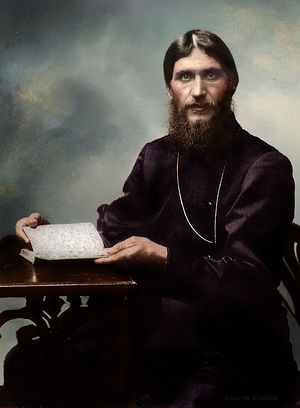
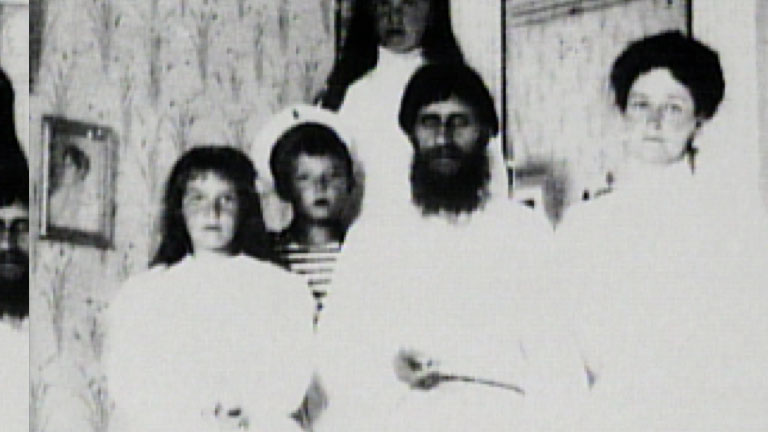
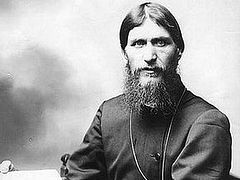
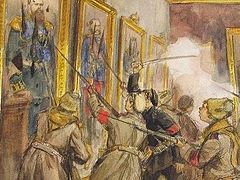
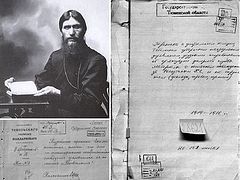
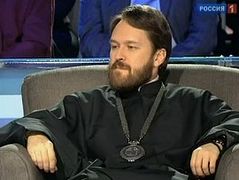
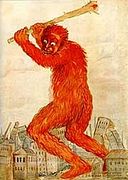
This is wrong.
God BLESS you for this article. Pray for Vladimir Putin and the peoples of Russia. I believe Putin is a man of God or used by God to protect the nation that is at its heart deeply Christian, even if the powers that be- at this time, are not, overall.